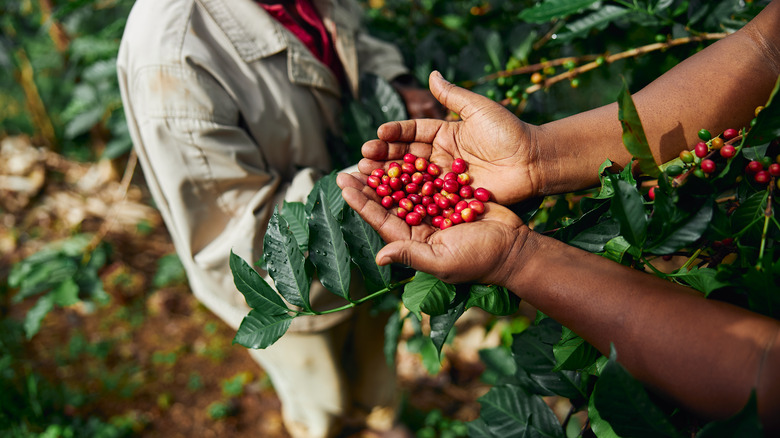The Coffee You're Drinking Probably Came From This Country
You're probably not pondering where your coffee came from when you sip your morning brew, but have you ever wondered? The World Population Review says that there are roughly 70 countries that produce coffee, and 50 of those countries produce and export it from their own soil. That's a lot of beans! According to PR News Wire, American coffee consumption in 2022 has soared to a two-decade high. Perhaps the jolt in numbers of those reaching for a caffeine buzz is related to new post-Covid morning routines?
Regardless, PR News Wire says that 66% of Americans drink a daily cup of joe. That fact explains why specialty coffee drinks such as cappuccinos, lattes, and mochas reached a five-year high as the National Coffee Association reported earlier this year. There are many countries from which those brewed beans may have originated, but one country is stampeding the java race and that's Brazil, according to the International Coffee Organization.
Brazil Leads The Coffee Race
Brazil produces more than 55 million bags of coffee each year, according to Coffee Affection. Covid-19 lockdowns and faltering weather conditions affected Brazilian coffee production negatively, causing prices to increase in 2021. Prices stabilized in 2022 as the weather improved, but coffee prices haven't only affected ground beans found in stores. Starbucks' prices have fluctuated over the past few years as well, as CBS reported in early February.
According to Sprudge, Brazilian coffee is primarily made of Arabica beans which can be traced back to Ethiopia. Nespresso says that these beans grow well in tropical climates such as Brazil, the largest producer of Arabica coffee. The beans are harvested from the nearly 2.5 million Brazilian coffee bean acres in Minas Gerais from May to September every year, according to Medium. Minas Gerais is a state in Southeastern Brazil that is credited for the largest coffee harvesting in Brazil.
According to the Espresso Coffee Guide, Brazil exports and supplies about 60% of the globe's brew, making it the largest java exporter in the world.

